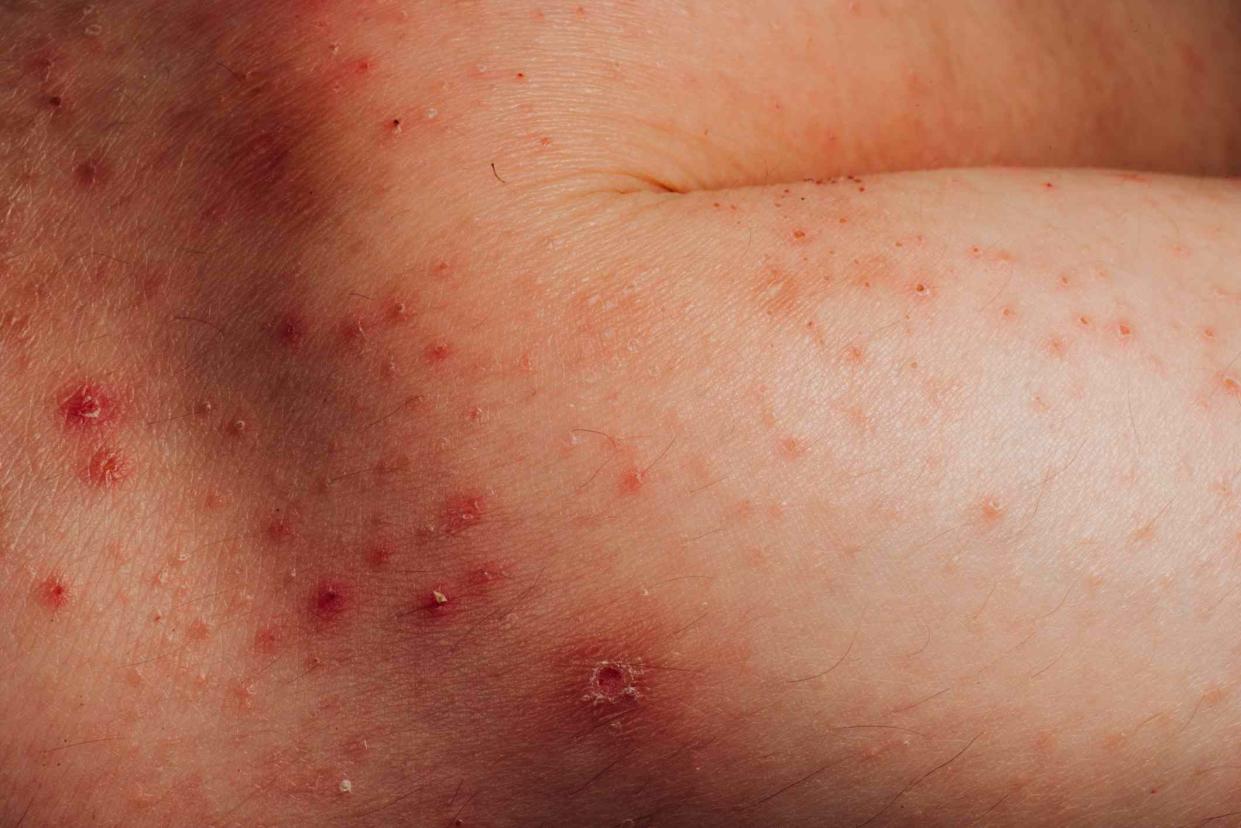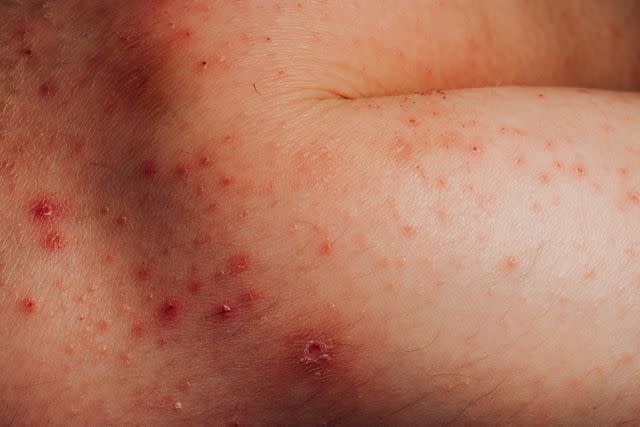Eczema Before, During, and After Menopause

Medically reviewed by Susan Bard, MD
Menopause is a time of significant change, and skin changes are common. You may have noticed that your skin has become drier and more sensitive over time. This may be due to menopause, aging, or both.
Eczema is a common inflammatory skin condition that causes the skin to become red, irritated, and itchy. Eczema may be related to menopause because the skin is affected by hormonal changes.
It’s estimated that more than 31 million Americans have been diagnosed with eczema. It is common in babies and children. In adults, the condition is most commonly diagnosed either in a person’s 20s or after age 50.
This article will provide an overview of the relationship between eczema and menopause and how to treat it.

Estrogen, Menopause, and Skin Changes
During perimenopause and menopause, the estrogen level in the body significantly decreases. This drop in estrogen is responsible for many physical changes associated with menopause, including to the skin. People going through menopause may notice that their skin seems more sensitive, drier, and less resilient. These changes can then lead to eczema.
There are a high number of estrogen receptors in the skin. That is why the skin is so sensitive to hormonal changes. People going through eczema often experience decreased collagen levels, skin wrinkles, skin thinning, flaking, and bruising.
What Is Menopause?
Menopause is defined as going 12 months without a menstrual period. In the years leading up to menopause, known as perimenopause, many people experience irregular periods, as well as other symptoms. The transition to menopause usually begins around the ages of 45 to 55.
Eczema Symptoms
Eczema is an inflammatory skin condition that causes patches of itchy skin. In people with light-colored skin, it can appear red. In people with darker skin tones, the color change may be less obvious, from gray to purple-brown.
Common symptoms of the condition include:
Rough skin
Dryness
Scaling
Itching
Oozing
Symptoms of Menopause
Common symptoms of menopause include:
Hot flashes
Night sweats
Headaches
Joint pain
Fatigue
Disturbed sleep
Depression
Irritability
Loss of libido
Related Co-Occurring Conditions
Menopause leads to several physical, psychological, and hormonal changes.
The amount of collagen in the skin also changes with menopause. Collagen is a protein that gives skin elasticity and resilience. It helps your skin spring back into place rather than sagging. It’s estimated that the skin loses 30% of its collagen during the first five years of menopause and 2% per year for the next 20 years.
Skin changes associated with menopause include:
Dryness
Wrinkles and sagging
Rashes
Bruising
Acne
Facial hair
Slower wound healing
At menopause, the ovaries stop functioning and stop producing estrogen. This can lead to other skin changes, including:
Vaginal atrophy: Thinning of the vagina that may lead to dryness, burning, and pain
Vulvar lichen sclerosus: A chronic atrophic autoimmune skin disease that causes nighttime itching, irritation, and painful intercourse
Dysesthetic vulvodynia: Wide-spread spontaneous pain in the vulvar region
Vulvovaginal candidiasis: A fungal infection around the vaginal region
Skin Changes in Perimenopause
The years leading to menopause are considered perimenopause. During this time, the body is transitioning into menopause when the ovaries stop functioning. Estrogen levels are starting to fall during perimenopause, so it is possible to start experiencing skin changes before you have entered menopause.
Learn More: Signs and Symptoms of Perimenopause
Managing Eczema With Menopausal Symptoms
The skin changes that accompany menopause can feel quite burdensome. Fortunately, there are treatments available to offer some relief.
Destressing: Making Space for Self-Care
Stress and skin health are connected, so managing your stress can positively impact eczema. It can also improve other menopausal symptoms, such as irritability and depression. To get started, find a stress management technique that works for you. Here are a few ideas:
Deep breathing
Practicing mindfulness
Gentle movement
Journaling
Working on a hobby
Going for a walk
Learn More: How to Manage Stress: Top Strategies for Stress Relief
Safe Products
When you have eczema, your skin is especially sensitive to your environment. Any skin care product with strong scents or chemicals can irritate the skin.
Check the ingredient list when buying products that touch your skin, such as makeup, lotion, or laundry detergent. Look for products that are gentle and fragrance-free.
Emollients
Emollients are components of certain skin products that help to heal and moisturize the skin. Examples include urea, glycerine, and alpha hydroxy acids. Choose skin care products that contain emollients and avoid any ones with lanolin or fragrances.
Related: How to Heal Dry Skin With Emollients
Change Your Shower Routine
If you’re a fan of scalding hot showers, the hot water may be contributing to your skin irritation. For people with eczema, warm, short showers are best. This is because hot water can dry out the skin.
After your short shower, dry off with a 100% cotton towel and apply a gentle moisturizer.
Healthy Diet
The skin is impacted by a person’s diet, so making some small tweaks could improve your eczema management. First, stay hydrated. Dry skin can worsen when you’re dehydrated. Aim to keep a water bottle with you at all times.
For your meals and snacks, be mindful of consuming healthy fats, protein, zinc, and vitamin C.
Corticosteroids
A corticosteroid may be the next step when lifestyle changes and over-the-counter (OTC) medications do not improve your eczema. Steroids can lower inflammation in the body and calm irritated skin. Topical corticosteroids are available as both OTC creams and prescription-strength options.
Prescription Medications
Topical calcineurin inhibitors may be prescribed for maintenance after the breakout has been extinguished with steroid cream. These include Elidel (pimecrolimus) and Protopic (tacrolimus).
Eucrisa (crisaborole) was approved by the Food and Drug Administration (FDA) in 2016 to treat eczema by decreasing inflammation. Opzelura (ruxolitinib) is approved to treat mild to moderate eczema in people over age 12.
Biologics such as Dupixent (dupilumab) or Adbry (tralokinumab) and Janus kinase (JAK) inhibitors such as Rinvoq (upadacitinib), and Cibinqo (abrocitinib) are approved to treat severe eczema and can be used with steroids.
Lifestyle Changes
Taking care of our skin is important at any age and especially vital when you have eczema. As you age, care for your skin by wearing sunscreen daily, receiving routine skin cancer screenings, and following up with your dermatologist about changing age spots.
Do You Need a Gynecologist, Dermatologist, or Both?
Because menopause and eczema are linked, which provider to consult for the issues can feel confusing. A dermatologist (a medical doctor specializing in diagnosing and treating conditions of the skin, hair, and nails) can guide your treatment for eczema. If you are experiencing any additional menopause symptoms, such as hot flashes or vaginal dryness, talk with your gynecologist (a medical doctor specializing in diagnosing, treating, and providing routine care of the reproductive system in women).
One possible menopause treatment, hormone replacement therapy (HRT), can help to treat several menopause symptoms, including skin irritation. HRT works by replacing estrogen and progesterone in the body. It has been proven to improve skin thinning and dryness. Talk with a healthcare provider to determine if HRT is a good fit for you.
Summary
Eczema is an inflammatory skin condition that causes itchy, red, inflamed skin. The risk of eczema may increase when a person goes through menopause, a time when the skin is affected by hormonal changes. During menopause, the ovaries stop functioning and producing estrogen.
There are several treatment options for eczema related to menopause. Talk with your healthcare provider about prescription medications if needed. Work on managing your stress and consider making lifestyle changes to benefit your skin.
Frequently Asked Questions
Is it possible to get eczema in your 50s?
Yes, the most common times to be diagnosed with eczema as an adult are in your 20s and after age 50. The skin changes with age, and dryness and irritation are common.
When does eczema during menopause go away?
Menopause may trigger eczema because of low levels of estrogen. Estrogen levels stay low after menopause, so you will likely not experience an improvement on its own. It’s important to work with your healthcare provider to get the help you need.
What foods help with eczema and menopause symptoms?
Eczema is an inflammatory condition, so avoiding inflammatory foods may be helpful in reducing your symptoms. Try to avoid red meat, gluten, shellfish, citrus fruits, cow’s milk, and dairy products.

